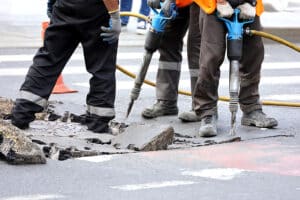Occupational hearing loss is a serious issue that can affect anyone exposed to loud noise at work. It’s a kind of hearing loss that gets worse over time because of loud noises in the workplace. Taking care of your hearing is important not only for your overall health but also for how well you do at work.
Understanding Occupational Hearing Loss
What is Occupational Hearing Loss?
Occupational hearing loss is a slow loss of hearing that happens when a person is exposed to loud noises or other dangerous conditions in their line of work. Depending on how long and how much you were exposed to it, it can be temporary or permanent. There are three main types of occupational hearing loss:
- Sensorineural: Caused by damage to the hair cells in the inner ear or the auditory nerve itself, often due to prolonged exposure to loud noises.
- Conductive: This type involves blockages or damage in the outer or middle ear, which could be caused by foreign objects, impacted earwax, or infections.
- Mixed: A combination of sensorineural and conductive hearing loss.
Causes of Occupational Hearing Loss
Understanding the causes of occupational hearing loss can help in formulating prevention strategies. The main causes include:
- High Noise Levels: Constant exposure to noise above 85 decibels can lead to hearing loss over time.
- Chemical Exposure: Certain chemicals, either as vapors or in combination with noise exposure, can damage the inner ear.
- Poorly Designed Workspaces: Lack of soundproofing and absence of noise barriers contribute to increased noise levels.
- Vibration and Other Environmental Factors: Exposure to vibration from machinery and tools can also affect hearing capabilities.
Professions at Risk
Certain professions have a higher risk of occupational hearing loss due to the nature of the job. These include:

- Manufacturing: Factories with heavy machinery are often noisy environments.
- Construction: Using power tools and big pieces of equipment adds to the noise level.
- Music and Entertainment Industry: Musicians, DJs, and people who work with sound are often around loud music for long periods of time.
- Aviation: Pilots and airport ground staff work in conditions with high ambient noise.
- Others: Other professions such as mining, agriculture, and military service also pose a significant risk of hearing loss.
Protecting Your Hearing in the Workplace
1. Regular Check-ups with an Audiologist
When you visit an audiologist regularly for a consultation, you are likely to catch the initial signs of hearing loss and address them before they get worse. Especially if you work at a loud environment, an audiologist can help provide you with professional advice.
An audiologist will conduct various tests to assess your hearing health. Additionally, they may ask for your medical history and ask about the situation you have at work for better evaluation.
2. Volume Control
Where possible, limit your exposure to loud noise. For instance, if your job doesn’t require constant presence near a noisy machine, spend your breaks in quieter environments.
3. Smart Gadget Use
Be mindful of the volume when using headphones or earbuds, especially in noisy environments where you might be tempted to turn up the volume to drown out background noise.
4. Healthy Lifestyle Choices
One of the best ways to take care of your hearing health is eating a well-balanced meal. Choose foods that are rich in vitamin C and zinc to keep your ears healthy. Working out regularly is also a helpful lifestyle habit for overall health.
5. Avoid Ototoxic Substances
Some medications and substances are ototoxic, meaning they can damage your hearing. Keep this in mind and make sure to ask your doctor about any potential side effects your medications may have on your hearing.
6. Advocate for Your Hearing
Don’t be afraid to speak up if you think your workplace isn’t doing enough to protect your hearing. Try to get better safety measures, noise assessments, and training programs.
Many places of work have safety committees whose job is to make the workplace safer. If your workplace doesn’t already have one, you might want to make one. These committees can be good places to start putting in place new safety measures.
7. Use Hearing Protection Devices
Hearing protection is one of the best ways to deal with noise in the workplace if you can’t get rid of it. Find out how to use them correctly and effectively in the next section.
Using Hearing Protection Effectively
It’s important to know what kinds of hearing protection are out there before you choose one. Some common ones are earplugs, earmuffs, and earplugs that are made to fit your ears. Your choice will depend on where you work, how comfortable you are, and how loud it is.
Types of Hearing Protection

- Disposable Earplugs: These are usually made of foam and can be rolled up and put into the ear canal.
They are cheap but don’t last as long.
- Reusable Earplugs: These are made of silicone or rubber and can be washed and used more than once.
They usually come with a cord to keep you from losing them.
- Earmuffs: These go around the outside of the ear and block out sound. Most of the time, they work better than earplugs, but they can be harder to wear.
- Custom-fit Earplugs: These are made to fit exactly in your ear canal. They are usually more expensive, but they protect and comfort you very well.
Best Ways to Use Hearing Protection
Correct Fit: No matter what type you choose, it must fit correctly. Incorrectly fitted hearing protection will not provide optimal noise reduction.
Combination Use: In extremely loud environments, it may be beneficial to use earplugs and earmuffs together for maximum protection.
Regular Inspection: Always check your hearing protection for signs of wear and tear. Damaged or worn-out equipment will not provide adequate protection.
Cleanliness: Keep reusable options clean. Dirt and grime can compromise their effectiveness and could lead to ear infections.
Know the Noise Reduction Rating (NRR): Hearing protection comes with a number called the Noise Reduction Rating (NRR). This number tells you how well the device blocks out noise. The level of safety is higher the higher the NRR. Make sure that the equipment you choose has an NRR that is right for your workplace.
Legal Aspects
When it comes to occupational hearing loss, it’s not just about the health and social effects; there are also legal issues that both employers and employees need to be aware of. This includes rules made by the government and the right of workers to a safe place to work.
OSHA Standards
The Occupational Safety and Health Administration (OSHA) has made rules about how loud it can be at work. OSHA says that if you are constantly exposed to noise levels above 85 decibels for 8 hours at work, you need to take steps to reduce your exposure.
Employers are required by law to check how loud their workplaces are and take steps to protect their workers. This could mean giving people the right Personal Protective Equipment (PPE), like earplugs or earmuffs, and putting in place engineering controls to cut down on noise at the source.
Employee Rights
Everyone who works has the right to a safe and healthy place to do their job. Employers must tell workers about possible dangers, like the chance of losing their hearing, and take steps to reduce these dangers.
Employees have the right to be given the right PPE to protect them from hazards in the workplace, such as loud noises. If you think your workplace isn’t doing enough to protect your hearing, you can ask for the right steps to be taken.
Consult an Audiologist

Do you work in a noisy place or find it hard to hear clearly? Don’t wait until your problems with hearing get worse. Visit Listen Hear Diagnostics in Westchester for a complete hearing test that takes into account the needs of your job. We offer advanced hearing health checks and diagnoses, as well as effective ways to deal with tinnitus and hearing aids that will improve your hearing health and help you do your job better.
Schedule your appointment today and take a proactive step against occupational hearing loss.



